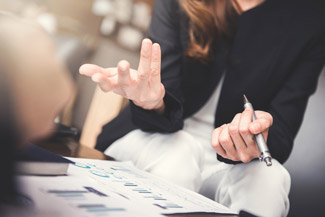Are questions with gestures more effective?
 While gestures vary between individuals and cultures, it's natural to gesticulate while speaking. More and more studies are looking into how these non-verbal signals affect our understanding. Do gestures facilitate or hinder comprehension? To shed light on the matter, a new Dutch study aims to demonstrate the positive effects of gestures when asking someone a question. How can adding gestures to a question make the interaction more effective?
While gestures vary between individuals and cultures, it's natural to gesticulate while speaking. More and more studies are looking into how these non-verbal signals affect our understanding. Do gestures facilitate or hinder comprehension? To shed light on the matter, a new Dutch study aims to demonstrate the positive effects of gestures when asking someone a question. How can adding gestures to a question make the interaction more effective? Oral communication is multimodal; it simultaneously solicits several semiotic systems: verbal (all of the areas related to “language": phonological, lexical, morphosyntactic, etc.), but also non-verbal (kinesics and proxemics) and para-verbal (all of the aspects that characterize the linguistic units and are transmitted via the auditory canal: intonations, pauses, articulatory intensity, speed, pronunciation, voice characteristics). For many years, research on non-verbal communication was conducted separately from linguistic studies, and the question of a relationship between speech and body language was largely ignored. But it is indeed from a multimodal perspective that this study was carried out by researchers from the Max Planck Institute for Psycholinguistics, the Institute for Brain Cognition and Behavior (Radboud University, the Netherlands), and the Linguistics Department at the University of York (UK).
Judith Holler and her colleagues first point out that hand gestures add meaning to what is said; in some situations, they account for 50 to 70% of the information. While face-to-face conversation remains the preferred mode of human communication, little research has been carried out on the role of gestures in alternating turns of speech. This is why researchers wanted to determine whether gesture influences the cognitive process underlying turn-taking in speech and whether it has an effect on the length of transition between turns in a conversation. Their study focuses on one type of communicative action: alternating sequences of questions and answers. For their research, the scientists analyzed the interactions of seven groups of three participants. The participants were divided into triadic conversation groups as follows: two all-male groups, two all-female groups, and three mixed groups (average age = 30 years). Once the participants were equipped for the recording session, the experimenters left them on their own for 20 minutes. During this time, they were allowed to converse freely. The analyses were then focused specifically on the question-answer sequences (281 in total). What do the results show?
J. Holler’s team found that “Questions accompanied by gestures lead to shorter turn transition times—that is, to faster responses—than questions without gestures.” Also of note, turn transitions happened even more quickly when the gestures (usually made with the head or hands) ended "early" with respect to speech (end of the question). This means that, in this case, the gestures alert the listener that the speaker is about to finish, helping the listener to prepare their response more quickly, even if the (verbal) question isn't complete.
According to the study’s authors, “The empirical findings presented here provide a first glimpse of the role of the body in the psycholinguistic processes underpinning human communication.” Based on these findings, it seems more than necessary to double up research efforts on multimodal communication, and particularly on non-verbal signals in learning and understanding processes.
Source: J. Holler, K. H. Kendrick, S. C. Levinson, “Processing language in face-to-face conversation: questions with gestures get faster responses”, in Psychonomic Bulletin & Review, Sept. 2017







